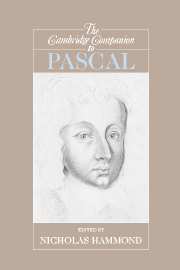Book contents
- Frontmatter
- Introduction
- 1 Pascal’s life and times
- 2 Pascal’s reading and the inheritance of Montaigne and Descartes
- 3 Pascal’s work on probability
- 4 Pascal and decision theory
- 5 Pascal’s physics
- 6 Pascal’s philosophy of science
- 7 Pascal’s theory of knowledge
- 8 Grace and religious belief in Pascal
- 9 Pascal and holy writ
- 10 Pascal’s Lettres provinciales
- 11 Pascal and the social world
- 12 Pascal and philosophical method
- 13 Pascal’s Pensées and the art of persuasion
- 14 The reception of Pascal’s Pensées in the seventeenth and eighteenth centuries
- Bibliography
- Index
6 - Pascal’s philosophy of science
Published online by Cambridge University Press: 28 May 2006
- Frontmatter
- Introduction
- 1 Pascal’s life and times
- 2 Pascal’s reading and the inheritance of Montaigne and Descartes
- 3 Pascal’s work on probability
- 4 Pascal and decision theory
- 5 Pascal’s physics
- 6 Pascal’s philosophy of science
- 7 Pascal’s theory of knowledge
- 8 Grace and religious belief in Pascal
- 9 Pascal and holy writ
- 10 Pascal’s Lettres provinciales
- 11 Pascal and the social world
- 12 Pascal and philosophical method
- 13 Pascal’s Pensées and the art of persuasion
- 14 The reception of Pascal’s Pensées in the seventeenth and eighteenth centuries
- Bibliography
- Index
Summary
Pascal's philosophy of science did not result from a detached philosophical reflection on the scientific achievements of others. It was honed, instead, in his intense, personal involvement in the religious and philosophical controversies that convulsed the kingdom of Louis XIV in the middle of the seventeenth century, and in which this notoriously combative defender of Jansenism played a leading role. The scope of Pascal's own scientific work was modest, and was primarily concerned with pneumatics. However, the experimental character of his research was such that it provoked discussion of a number of important issues that were implicit in the new mechanical philosophy, including its relationship to traditional metaphysics. In fact, Pascal's appeal to experimental evidence in support of his scientific theories against critics provided an ideal vantage point from which to address critically the epistemology of science, and to compare the certainty or otherwise of its theoretical claims with dogmatic religious teaching and with the traditional philosophy of the schools. This focus on the relative certainty of competing types of belief - scientific, religious or philosophical - and on alternative strategies for resolving apparent conflicts between them, was not unique in the scientific revolution. Many scientists, from Galileo to Newton, addressed similar questions. In the case of Pascal, however, the intensity of his personal faith and his public commitment to the rigorous piety of Jansenism made it impossible for him not to reflect on the status of scientific results that were confirmed by what appeared to be incontrovertible experimental evidence. It is easy to understand, in retrospect, how the focus of Pascal's philosophy of science was the role of experimental evidence in the confirmation and disconfirmation of scientific theories.
- Type
- Chapter
- Information
- The Cambridge Companion to Pascal , pp. 102 - 121Publisher: Cambridge University PressPrint publication year: 2003



